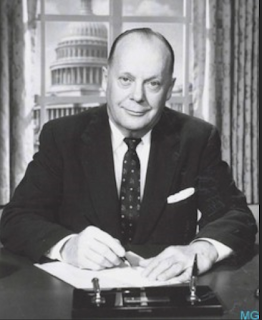The bill established for the State Department to communicate to audiences outside of the United States through various means, including broadcasting and print media. It was first introduced at the end of World War II, and sought to keep permanent some of the means of technology that were utilized during the war. The Office of War Information was discontinued by President Truman at the war's end, but most of its features were moved to the State Department. This included the publishing of books and films, as well as the operation of a radio station that would eventually become known as Voice of America.
The Smith-Mundt Act faced difficulty getting through Congress. With the Red Scare in its early phases, multiple representatives believed that Communists were infiltrating the State Department. These fears were the main reason for opposition to the bill, as high-ranking members of important committees wanted to essentially purge the State Department of so-called "traitors." The initial bill passed the House of Representatives, but died in the Senate when nobody would co-sponsor. In March 1947, Mundt again raised the bill in the House, which was expanded on both his original legislation. After this one passed the House, Senator H. Alexander Smith (R-NJ) co-sponsored the bill in the Senate. After many high-ranking State Dept. representatives testified in the Bill's favor, it was ultimately passed in the Senate and signed by President Truman.
The big reason for the Smith-Mundt Act's passage was for the United States to have a direct line of communication to foreign nations in order to combat propaganda from the Soviet Union and other Communist nations. Essentially, America sought to combat propaganda with their own propaganda, which is essentially why the bill was established. The Office of War Information was created to rally Americans behind the fight against the Axis Powers, and the Smith-Mundt Act sought to continue its features as the Cold War was in its early years, albeit the U.S. was looking to influence foreigners rather than Americans. Congress knew that these efforts could come off looking very similar to Soviet and even Nazi tactics, so they sought out multiple means so as to not be on par with them. Mainly, the United States Information Agency and State Dept. were unauthorized with sharing these international messages with an American audience, as disseminating these materials to them would come off as propaganda. In addition, the State Department was not allowed to establish a media monopoly, and allow private broadcasters to continue operating and even review the role of the government. The federal government couldn't get too much influence in this area, so while the State Dept. sought to maximize use of private agencies, they weren't allowed to get too close.
No American was really ever going to be impacted by this bill since State Dept. messages could not be shared within our borders. However, he ban on sharing international messaging within the United States was lifted in late 2012, when the bill was re-authorized by Congress. This was done to combat online influence of terrorist organizations, but realistically, any President can now legally subject Americans to propaganda through government-led radio and television broadcasts. I'm not so sure if President Trump is aware of this, because with his attacks on the free press, this bill would come in good use to him. Every American would likely face the same effects of propaganda if it were to ever be pushed on the public, and even if people don't believe it, the constant bombardment of lies could eventually wear down any realistic resistance to the government-run broadcasts.
Even before the authorization of propaganda in the 2012 amendment, the Smith-Mundt Act was always an American form of propaganda. At the same time, however, the bill still prevents government monopolies on the media and the bill is not exempt from Freedom of Information Act (FOIA) requests. Legislation like this would be useful for war, and was considerably helpful during the Cold War, but with the Soviet Union now gone, it might be best for the United States to repeal this bill altogether. There is no need to combat Communism anymore, so Congressional funding shouldn't really be going to a propaganda arm of the USA if there is no enemy to influence people against.
Representative Karl Mundt (R-SD), who introduced the bill and for whom it is named after.
https://en.wikipedia.org/wiki/Smith%E2%80%93Mundt_Act
https://www.techdirt.com/articles/20130715/11210223804/anti-propaganda-ban-repealed-freeing-state-dept-to-direct-its-broadcasting-arm-american-citizens.shtml




No comments:
Post a Comment